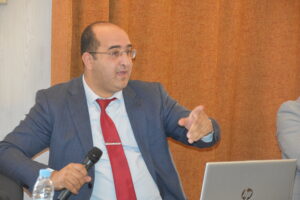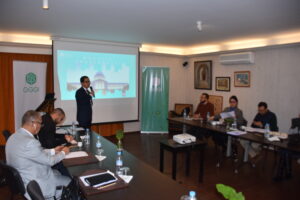The global interest and focus during COP26 & COP27 on Article 6 have demonstrated the importance of facilitating climate action and producing inroads for unprecedented international cooperation through market-based mechanisms. Anticipating the importance of carbon markets to climate action, GGGI has piloted and built programs that facilitate the Paris Agreement such as Designing Article 6 policy approaches (DAPA) funded by the government of Norway.
In Morocco, through DAPA, in partnership with the Department of Sustainable Development of the Ministry of Environment, GGGI unveiled 4 Article 6 training sessions. The training aimed to equip government officials and policymakers, public institutions and other stakeholders’ representatives in their decision-making processes to ensure effective participation in Article 6.2 and making carbon transactions a reality for Morocco. Held on the 21st– 23rd of February 2023, the training under the theme of “Article 6 of the Paris Agreement” was also a key milestone of the DAPA program ushering in its second phase. Phase II of the program is dedicated to the design of policy approaches eligible for carbon transactions in four countries, including Morocco. During this event, a key representative from the Ministry of Environment, Mr. Rachid Tahiri, Head of Climate Change and Green Economy Division, seized the opportunity to showcase their current work related to the fight against Climate Change, their ambitions in terms of Nationally Determined Contributions (NDCs) and their strategy for MRV, transparency and reporting. He also highlighted the importance of knowledge building, mentioning that articles 6.2 and 6.4 “will be a crucial tool for decarbonization since they will encourage the lowest cost abatement across the economy, ensure that polluters pay, and stimulate investments [and] Morocco by this training and through the technical assistance provided by GGGI has a special chance to take part in it.”
“The training emphasized the need for promoting carbon finance in the region where Article 6 presents an innovative and challenging opportunity to drive climate ambition through bilateral agreements, mobilizing finance and boosting competitiveness,” the Morocco DAPA lead Said. The training was organized to strengthen the knowledge of key stakeholders and enable their ability to support highly ambitious national climate change objectives and help deliver transcendental benefits that can systematically support climate change efforts. GGGI is delivering to its Member States and Partners the much-needed capacity to define and implement the best approaches to participate in international carbon transactions as active leaders.
Hence, this training has allowed participants to take a deep dive into the outcomes of COP27 regarding the article 6 mechanisms. This included the activity cycle for article 6 programs, their safeguards and financial flows, the principles of environmental integrity which help ensure the credibility and quality of the emissions to be traded. In addition, the training focused on how the Clean Development Mechanism (CDM) from the Kyoto Protocol will transition into the Paris Agreement. Participants were also given a chance to learn more about how to negotiate a MOPA agreement with another sovereign or with a private entity. This training was undeniably an aim to improve the readiness of Morocco to fulfil its engagements toward the Paris Agreement.
Through this training, GGGI hopes that Morocco is empowered with the knowledge they need to make complex and often new approaches like Article 6 a reality. The training further demonstrated GGGI’s commitment to capitalizing and building the capacity of member and partner nations.
.
